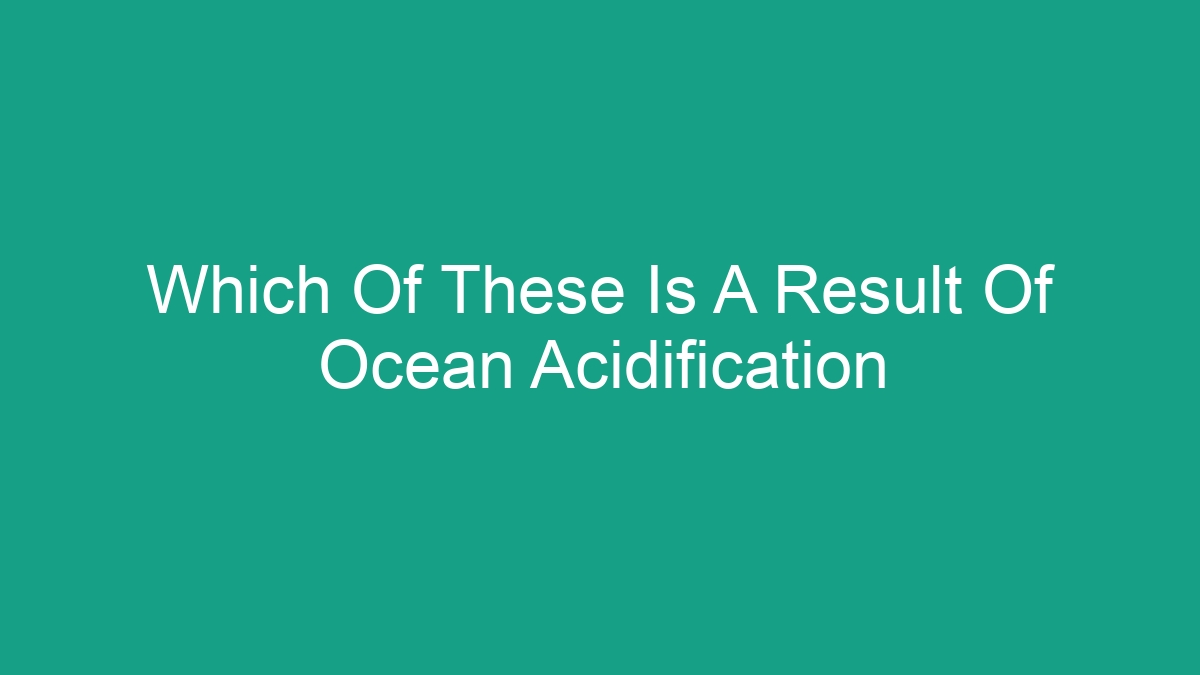
Introduction
Ocean acidification is a significant environmental issue that is caused by the uptake of carbon dioxide (CO2) from the atmosphere into the oceans. This process leads to a decrease in the pH of seawater, making it more acidic. As a result, ocean acidification has far-reaching consequences for marine ecosystems and the organisms that rely on them.
Effects of Ocean Acidification
In this article, we will explore the various effects of ocean acidification and how it impacts marine life and ecosystems. Below are some of the key consequences of ocean acidification:
- Impact on Marine Life: Ocean acidification can have profound effects on marine life, particularly on organisms that rely on calcium carbonate to build their shells and skeletons. As the pH of seawater decreases, it becomes more difficult for these organisms, such as corals, mollusks, and some types of plankton, to form and maintain their calcium carbonate structures. This can lead to weakened shells, slower growth rates, and increased vulnerability to predators.
- Disruption of Food Chains: Ocean acidification can disrupt marine food chains by affecting the ability of certain species to survive and thrive. For example, the decline of calcifying organisms at the base of the food chain can have cascading effects on the entire ecosystem, impacting the availability of food for larger marine animals and ultimately affecting commercial fisheries.
- Changes in Biodiversity: The acidification of the oceans can lead to changes in the distribution and abundance of marine species. Some species may benefit from the changing conditions, while others may struggle to adapt, leading to shifts in the overall biodiversity of marine ecosystems.
- Impact on Coral Reefs: Coral reefs are particularly vulnerable to ocean acidification due to their reliance on calcium carbonate structures. As the pH of seawater decreases, corals can struggle to build and maintain their skeletons, making them more susceptible to damage from storms, disease, and other stressors.
- Impacts on Fish Behavior and Physiology: Ocean acidification can also affect the behavior and physiology of fish, including their sensory functions, reproductive success, and survival rates. These changes in fish populations can have significant implications for the health and functioning of marine ecosystems.
Factors Contributing to Ocean Acidification
There are several factors contributing to ocean acidification, including:
- Carbon Dioxide Emissions: The primary driver of ocean acidification is the increase in atmospheric carbon dioxide levels resulting from human activities, such as the burning of fossil fuels and deforestation. These activities release large amounts of CO2 into the atmosphere, a significant portion of which is then absorbed by the oceans, leading to a decrease in seawater pH.
- Land-Based Pollution: Pollution from land-based sources, such as agricultural runoff and industrial waste, can also contribute to ocean acidification by introducing excess nutrients and pollutants into coastal waters. These inputs can lead to algal blooms and low-oxygen dead zones, further exacerbating the effects of acidification on marine ecosystems.
- Climate Change: The warming of the Earth’s climate also plays a role in ocean acidification, as rising temperatures can alter ocean circulation patterns and increase the stratification of seawater. These changes can affect the distribution of nutrients and oxygen in the oceans, impacting the ability of marine organisms to cope with acidification.
Mitigation and Adaptation Strategies
Efforts to mitigate and adapt to the effects of ocean acidification are crucial for safeguarding the health of marine ecosystems. Some potential strategies include:
- Reducing Carbon Emissions: One of the most effective ways to address ocean acidification is to curb the emissions of carbon dioxide and other greenhouse gases. This can be achieved through policies and initiatives aimed at promoting renewable energy sources, improving energy efficiency, and fostering sustainable land use practices.
- Protecting Coastal Habitats: Enhancing the resilience of coastal habitats, such as mangroves, salt marshes, and seagrass meadows, can help to mitigate the impacts of ocean acidification by providing crucial habitats for marine species and improving water quality.
- Advancing Research and Monitoring: Investing in research and monitoring efforts can improve our understanding of ocean acidification and its effects, helping to inform the development of effective conservation and management strategies for vulnerable marine ecosystems.
- Adopting Sustainable Fisheries Practices: Implementing sustainable fisheries management practices can reduce the pressure on marine ecosystems and help to maintain the health and productivity of ocean ecosystems in the face of acidification.
Conclusion
Ocean acidification is a complex and urgent issue that demands concerted action to address its far-reaching effects on marine life and ecosystems. By understanding the causes and consequences of acidification and implementing mitigation and adaptation strategies, we can work towards preserving the health and resilience of our oceans for future generations.
FAQs
Q: What are the main causes of ocean acidification?
A: The primary causes of ocean acidification are the uptake of carbon dioxide from the atmosphere into the oceans, resulting from human activities such as the burning of fossil fuels, deforestation, and land-based pollution.
Q: What are some of the most vulnerable marine organisms to ocean acidification?
A: Marine organisms that rely on calcium carbonate to build their shells and skeletons, such as corals, mollusks, and some types of plankton, are particularly vulnerable to the effects of ocean acidification.
Q: How can individuals contribute to addressing ocean acidification?
A: Individuals can contribute to addressing ocean acidification by reducing their carbon footprint, supporting sustainable fisheries and coastal conservation efforts, and advocating for policies and initiatives aimed at mitigating climate change and protecting marine ecosystems.



